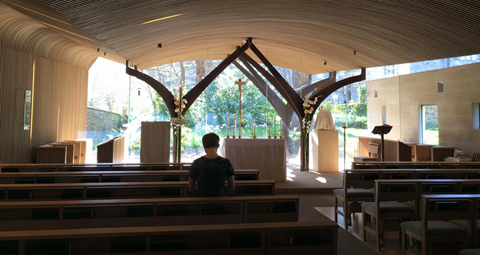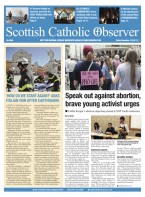November 4 | ![]() 0 COMMENTS
0 COMMENTS ![]() print
print

IT’S MORE THAN ACADEMIC
In her latest report on the various and differing communities that make up the Catholic church in Scotland, DOROTHY CUMMINGS McLEAN visits the students at university in Edinburgh and Glasgow who refuse to let the academic life compromise the expression of their religious beliefs
ONE of the great changes in Scottish society is the number of Catholics who have gone to university and entered the professions since the Scottish Education Act of 1918.
Where Catholic students have gone, Catholic chaplains have followed—or, rather, returned.
For example, Dominican friars taught at the universities of St Andrews in 1411, Glasgow in 1451 and Aberdeen in 1495. They were expelled during the Reformation, as were the Dominicans of Edinburgh, who first established their priory here in 1230.
The Dominicans returned to Edinburgh in 1931 and to Glasgow in 1965. They served as chaplains at the University of Aberdeen at the turn of this century, but since 2014 the Franciscans have also returned to Aberdeen and taken on that responsibility.
Since the 19th century, Catholic chaplaincies at universities across the mostly Protestant, English-speaking world have given Catholic students places in which to worship, socialise and attend lectures of Catholic interest.
Having gone to the University of Toronto’s Newman Centre, I welcomed a chance to visit Edinburgh’s Catholic Student Union (CSU) in George Square.
The event was a Friday night screening of Karol: A Man Who Became Pope, the two-hour 2005 biopic about St John Paul II. I arrived in the Georgian house to the sound of a choir practice. Gabriela Goralczyk, a 20-year-old maths student from Coventry, was playing the piano while a number of students warbled Tell Out, My Soul.
In the kitchen behind them, Benedikt, a 20-year-old in the Philosophy and Politics programme, was having a conversation with Camille, 22, an exchange student majoring in Scottish Literature. Benedikt is from St Gallen, Switzerland, whereas Camille is from Brest in France. They looked comfortable on the cheerful red couch and I drew up a chair to ask them how they got there.
“I was born and bred a Catholic,” Benedikt said. “I joined the CSU as I would obviously go to Mass anyway and as it happens the community is very charming here. I grew into it naturally, through speaking to people after Mass.”
“I was a freshly-arrived student and I wondered where I could meet people,” Camille said. Fortunately, she was given a clue during her first week. “They handed me a book and I found in it the CSU.” Camille’s love of classic Scottish literature had given her a somewhat old-fashioned impression of Catholic life in Scotland. “I was worried that it would be more difficult to find a Mass in the Lowlands,” she admitted. Both Benedikt and Camille thought meeting people was their primary challenge as foreign students in Scotland.
The CSU has helped them to find people who share their Catholic values without preventing them from integrating into the wider community of Edinburgh University.
Benedikt hopes to join the equestrian club while Camille has joined the sailing club and the wine club.
Of CSU activities, Benedikt likes best the communal ‘mid-week meals’ and enjoyed a recent walk in the Pentlands. Camille likes the house on George Square in itself: “Mostly I like having a place to eat at lunchtime and talk to people. It’s nice to sit on a couch and talk to people about random subjects.”
She added that the CSU gives her a chance to stop and reflect on her faith and to help it grow.
When choir practice ended, there was a hubbub as more students arrived, sofas were rearranged, pizza money was collected, and a recalcitrant laptop refused to start the film.
Meanwhile, I admired the tidy kitchenette. It has a reproduction of a Renaissance painting of the Holy Family, a large and bright original painting — inspired by Kandinsky — sofas, a fridge, a sink, a dishwater, a coffee maker with coffee hot in the pot, a toastie-maker and an over-flowing recycling box. Students will be students. “Anything in the fridge is fair game!” warns a note.
Between the piano and the Georgian windows, Gabriela was in command. “I’m ordering margheritas because it’s Friday,” she shouted. “Is there anyone who must have meat on their pizza?” Nobody needed meat on their pizza, and the order was placed. The computer and projector finally agreed to start playing Karol: A Man Who Became Pope. There was some concern among the 14 or so present who do not speak Polish.
“It’s in English,” Gabby assured them. “Is there anyone who needs subtitles?” Karol: A Man Who Became Pope is not great art. Occasionally its Polish actors emphasise the wrong words, and the American actor playing the abominable Hans Frank sounds like Mel Brooks.
Nevertheless, the students watched avidly, crying when the violins told them to cry, which was often. They burst into giggles when the teenage Karol calls on a female friend and her landlady makes them keep the door open.
There was a short break when the pizzas arrived, but once they were handed around, the lights went out again. The film was, despite its defects, quite edifying. I cried too.
“We had the screening because I wanted people to see this film,” Gabby told me later. “Also I wanted more people to learn about our Polish pope as not many people know anything about his earlier life. And it was the 38th anniversity of his election, so it seemed fitting.”
After the film, I talked to Padraig, 20, from Glasgow and Ilya, 30, from Moscow. Padraig is a second-year student in the History and Politics programme who joined the CSU to express his faith in community at the university.
His parents met at the Edinburgh CSU. He appreciates the fact it is very international. “Right in this room we have a Russian, an Englishman, an American, two French people, one Swiss, one Spanish, two Poles. And two Scots. It shows the rich universality of the Church.”
Ilya joined the CSU after converting to Catholicism and deciding he needed to spend more time with ‘brothers in the faith.’ He has enjoyed meeting ‘so many good Catholics of various cultures and interests. Seeing so many young Catholics reminds me that Western society is not [over] yet.’ Over on the other coast, Glasgow University has had a Catholic chaplaincy since the mid-1920s.
According to historian Dr Tom Fitzpatrick, it was founded when a member of staff, William Eric Brown, converted to Catholicism and became a Catholic priest.
Today, Claire Deighan, 20, is the president of Glasgow University’s Catholic Association (GUCA). She is a third-year student, studying History.
“The Catholic Association is a long-standing group of Catholic students who organise and run events and groups that encourage students to practise and learn more about their faith,” she told me.
Claire joined the GUCA because she wanted to meet other young Catholics. Most of her friends in high school didn’t practis e their faith or much care about it. “I wanted to be a part of a place where I could get involved with those who did, whilst also growing in my understanding of my Catholic faith,” she said. As president, Clare encourages younger students to get involved at Chaplaincy’s Turnbull Hall. “My main roles include bossing Fr Ross about—just kidding—organising our main events and generally overseeing our different groups and programs. I try to be visible around the chaplaincy so that I can get to know new students.”
Her favourite social events include the ceilidhs. “Sometimes people are involved in different groups or clubs within GUCA, so there isn’t much chance to integrate. However, these nights provide a way of doing this and always have great turnouts from students of all ages.”
Although also international in character, the GUCA attracts many Scottish students who keep Turnbull Hall busy even during holidays. Claire is from Glasgow, and thinks the main challenge of being a Catholic at Glasgow University is trying to live one’s faith and values in one’s courses and among secular friends.
“It’s easy to live in the Catholic bubble at GUCA,” she said. “However, as Catholics we are called to evangelise. I think it’s so important to strike a balance between setting a joyful example as a practising Catholic and making time for the association.
I remember a priest saying to me that for many people, you can be the only Gospel they hear, and I think that is definitely the case at university. “Being a part of GUCA, we all try to give a good account of our faith, which can present a challenge just because of the secular time we are living in now.”
Ruairidh McLennan, also from Glasgow, is a 24-year-old masters student in Modern Languages. He became a Catholic ‘in a concrete sense’ shortly after he arrived at university. He became more involved with the Catholic association as his love of the sacramental life increased. “I came to wish that more would come to realise the importance of the gifts of the sacraments, and how they can change lives,” Ruairidh told me.
“I believed that the association and its apostolate could effect change in people’s lives while they were at university. Indeed, my own university experience would be wholly incomplete were it not for its Catholic dimension.”
This year, Ruairidh is the GUCA Welcoming Officer. He helps with students at Freshers’ Week and other student events and leads two faith forums, one for undergraduates and one for graduate students. Asked about his favourite events, he said that it’s the little things that stand out.
“Whenever any individual comes to the chaplaincy, or grows while at the association, that is always a very heartening thing to see,” he said.
“The friendship and solidarity among young Catholics, in what can be a very challenging environment, is helpful indeed. No-one is an island, of course, and we all rely on each other for prayer and advice, which we can always count on receiving.”
The challenging academic environment involves not only keeping grades and spirits up but living openly as believing Catholics in an ever more sceptical society.
Both Padraig in Edinburgh and Ruairidh in Glasgow mentioned having to confront ignorance and misconceptions as to what it is that Catholics really believe.
But Ruairidh believes that Catholic students themselves need to ‘know what faith in the Risen Lord’ means. He said: “It is that which must be nourished.”











